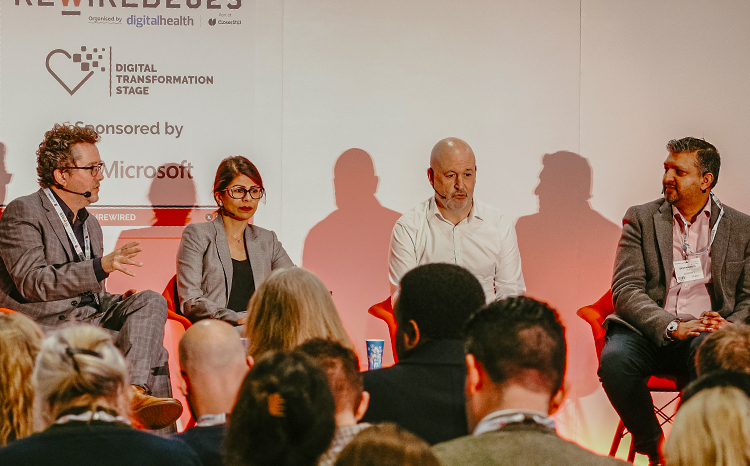Joe’s View: A very Aussie Christmas
- 23 December 2024

Joe McDonald is in Melbourne for the festive season. And it isn’t just the heat that feels like a welcome change – he’s impressed by the Aussie approach to interoperability
I roll the cold beer bottle across my forehead and the condensation cools my brow. The sun is beating down on The Arbor, a floating pub on the Yarra River in downtown Melbourne. It’s 35 degrees in the shade. The words “Merry Christmas” are strung incongruously across a bridge over the river in letters six feet high. The pub is festooned with reindeer and Santa fairy lights. Just behind the pub stands a giant Christmas tree. Plastic snow is dusted on shop windows. The culture of Christmas is oblivious to the Australian climate.
Christmas for me normally means a gathering of all my family in Newcastle; 20 people around the dinner table groaning under the weight of a gigantic tasteless turkey with all the trimmings. Not this year. My youngest son, a junior doctor, won’t get home this Christmas because he has decided to take a break from the NHS and work in Australia. Hence, we are in Melbourne.
Culture eats strategy
While the NHS is embarking on yet another 10-year strategy review, the long flight to Melbourne provided an opportunity for me to digest the Australian health IT strategy. It’s a well-written and considered document that acknowledges the complexity of health IT. It states that some of the information governance challenges will require changes in legislation and, if necessary, vendors will be legally obliged to interoperate.
However, we’ve all seen lots of lovely looking health IT strategies before, haven’t we? We know culture eats strategy for breakfast, just as Christmas overrides climate.
After mentioning that I am in town on social media I was kindly invited to be a guest at a two-day health IT event by the leadership team at Sparked, a multiagency effort funded by the Australian government to foster interoperability standards for Australian Health Services.
I was extremely grateful to attend a senior health IT leadership reception on my first evening in Melbourne where I met senior clinicians, department of health officials, vendors and academics over mince pies and Yarra Valley Sauvignon Blanc.
Had the politicans really handed fixing interoperability to the people who understand it?
There was much enthusiasm for pushing interoperability in general and fast healthcare interoperability resources (FHIR) in particular. There was much talk of being “FHIRed up”. Did they mean it? Had I dropped into a cult? Everyone was so nice and positive I did wonder if I was being love bombed or whether it was just the Christmas spirit. Had the politicians really handed fixing interoperability to the people who really understand it? Had Sparked cracked the cultural conundrum of interoperability?
Following on from the evening reception, I attended two day-long meetings organised by Sparked. Day one was termed ‘The Clinical Design Group’, where discussion focused on agreeing a standard for the content of an Australian version of the International Patient Summary.
A robust discussion was dominated by very knowledgeable clinicians, but the department of health officials and vendors remained in the room throughout. The discussion was chaired with considerable humour and style by Kate Ebrill (national lead sparked FHIR accelerator) who rewarded good contributions with tiny chocolate Santas (yes really).
The process is that once the clinicians have agreed the content, the ‘Technical Design Group’ work it up into standard ways of recording.
Doing the hard work
The Technical Design Group took place in the same venue on the following day. Again, there were robust discussions which generally came to a consensus. Where necessary, there was a voting system to make decisions on issues such as, for example, a standard way to report a pregnancy test. To the uninitiated this could appear mind numbingly dull, but my heart sang to see it. It took 45 minutes to bottom the issue. This is ‘doing the hard work to make it simple’ made flesh.
What is more, all the workings of both groups are published so anyone who wants to can comment. The principle being followed here is ‘making something open makes it better’. I was very much reminded of our own Government Design Principles for which I had high hopes but which seem to have gone out of fashion.
It was unlike any health IT ‘conference’ I’ve been to; because it wasn’t a conference, it was genuinely a workshop. Two solid days of work – on the face of it dull and detailed, grinding work.
The plan is for the workshop to be followed with a relentless drumbeat of work to do the unglamorous business of standardisation with similar meetings every fortnight. It reminded me of the good intentions we had when I was involved in the establishment of the Professional Record Standards Body 10 years ago.
The Australian government are throwing 17 million dollars at the need to build usable standards. They know that failing to do the hard work to make it simple would damn Aussie healthcare to years more siloed thinking and information sharing chaos.
A week after I was invited to attend Sparked’s meetings, I visited Alice Springs where I learned the story of how a telegraph line was constructed to connect South Australia to Darwin in the North and on to London. There was no easy way to do this but the desire to connect Australia to the rest of the world meant that a culture of ‘hard work to make it simple’ was developed.
Delivering the impossible
A wire was stretched across 36,000 telegraph poles across the entire continent to allow morse code (an agreed and adopted global standard) to be sent across a network of transmitting and receiving stations, just like the one at Alice Springs. Initially the staff at Alice Springs were resupplied with provisions just once a year by camel train.
The Aussies have a track record of delivering the seemingly impossible. With the culture Sparked have created, and their agreement on FHIR as a standard, they might just show the rest of the world the way to go.
While we ponder our new 10-year strategy, we would do well to make ourselves a Christmas present of Australia’s digital health strategy. And in the season of goodwill, we could adopt their open culture of doing the hard work to make it simple.
I wish you all a merry Christmas and a hard-working new year.






1 Comments
Australia ‘s Sparked community is something we could learn from and maybe replicate. The interoperability conundrum is global and really needs a global solution https://youtu.be/Vr4YlyoO_Ak?si=OXrsNNKFDtZwBPw8
Comments are closed.